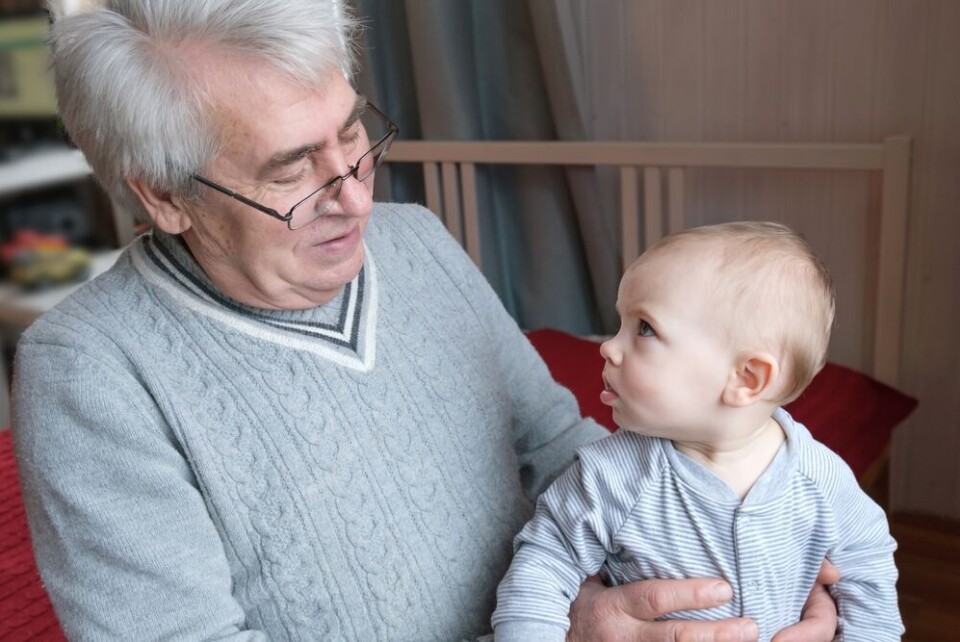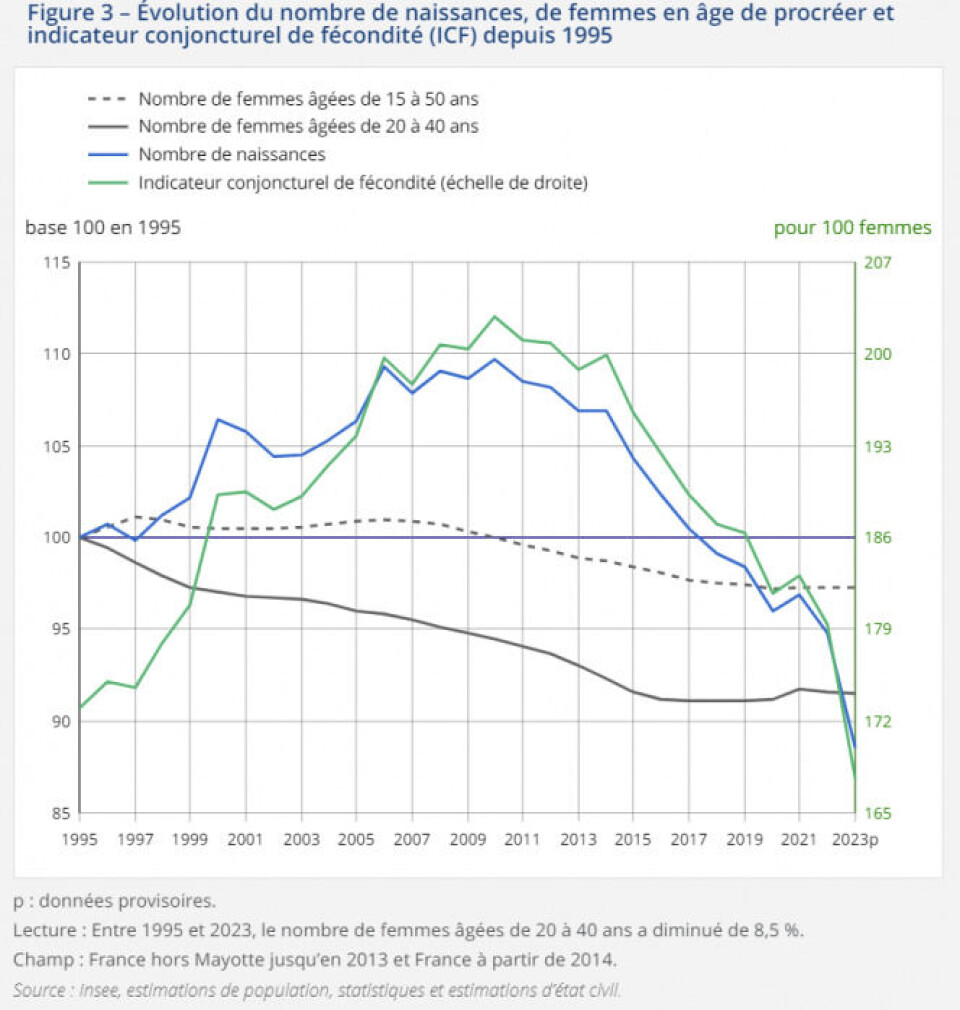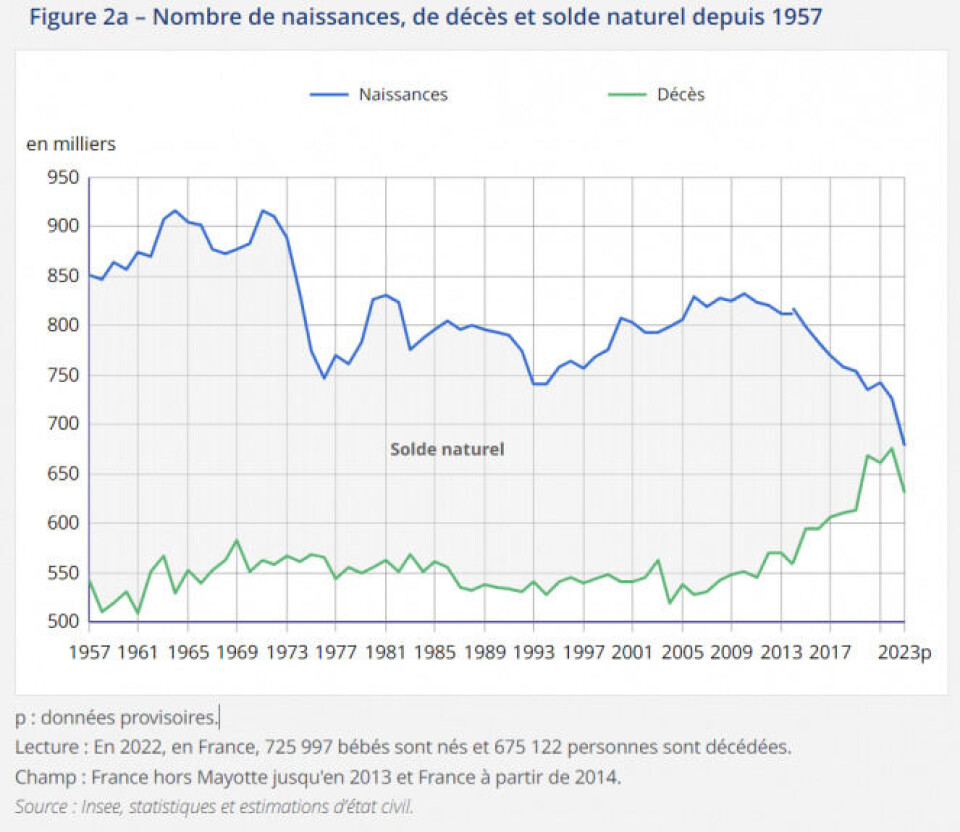-
Photos: Northern Lights dazzle Normandy skies
Coloured hues were also snapped in some areas of Brittany, with activity peaking before midnight
-
Easter traditions across France: From rattles and hooded processions to giant omelettes
Regional Pâques celebrations highlight France’s cultural diversity
-
French Google website google.fr will soon be replaced
Technology advancements have made local searches obsolete
Life expectancy in France hits a record - and births plummet
People in France can now expect to live the longest ever from birth, but the birth rate is dropping, and the population is ageing overall

Life expectancy in France has hit a record high, a new official report has found - although the birth rate is also at a record low - meaning that the population is ageing overall.
The report came from the national statistics institute Insee and was published on January 16.
President Emmanuel Macron made boosting the national birthrate part of his wishlist to ‘revive’ France on national television last night (January 16).
Life expectancy high
In 2023, life expectancy at birth was 85.7 years for a woman and 80 for a man. This is the highest ever level.
“This rise is significant,” said Insee, noting an increase of 0.6 years for women and 0.7 years for men compared with 2022.
The population of France is also ageing, as the baby boom generations (a period after World War Two, from 1945 to 1960) reach old age. One in five people in France is now aged 65 or over and one in 10 are aged 75 or over.
Birth rate decline
The birth rate declined sharply last year.
The number of births in 2023 dropped by almost 7% year-on-year, the figures show. There were 678,000 births in France last year, 48,000 fewer than the year before, bringing the birth rate below the ‘symbolic’ threshold of 700,000.
This is the first time that the number of births has dropped below 700,000 since comparable records began in 1957 (and then, the number was closer to 800,000, and 900,000 by the 1970s).
Read more: Fertility crisis? France’s birth rate hits near 30-year low
However, the fall was a continuation of a longer-term trend, with the birth rate having dropped “by around 20% compared to [the last peak in] 2010”, said Insee.
In 2023, there was also a new dimension to the fall; it happened across all ages (within the category of ‘people of childbearing age’), it added.
Overall, the birth rate in France is now at 1.68 children per woman, compared to 1.79 one year ago.
Insee said: “Since World War Two, this indicator has never been as low, except for in 1993 and 1994.”

Graph: Insee, showing the age of women aged 15 to 50 (dotted line), women age 20 to 40 (black line), the number of births (blue line), and the birth rate (green line), since 1957
High but falling death rate
The mortality rate has been high in France for the past three years, as a result of Covid, flu epidemics, and several dangerous heatwaves.
However, in 2023, it dropped by 6.5%, to 631,000. It is still higher than it was before the Covid crisis, as people of the baby boom generations reach old age.
Insee said that “mortality has tended to rise faster over the last ten years”, having risen by 1.9% between 2004 and 2014. This is much higher than the rise of 0.7% seen between 2004 and 2014.
Overall, this means that the death rate has been high in recent years, but has now begun to fall again.
Read our previous article: Babies, life expectancy: how Covid has affected France’s population
Population balance slowly recovering
The report also showed that the ‘natural balance’ of the population - the difference between the number of births and deaths - is at “its lowest level since World War Two”.
From 2020 to 2023, this number fell sharply due to falling births and higher deaths due to Covid.
However, in 2023 it was at +47,000 (with more births than deaths), meaning that as of January 1, 2024, France had a population of 68.4 million, an increase of 0.3% year-on-year.

Graph: Insee, showing the 'natural balance' (difference between births, blue line; and deaths, green line) since 1957
Marriages and PACS
After years of plummeting numbers, 2022 was a good year for unions, mainly due to a post-pandemic catch-up effect.
In 2023, the number of marriages in France was estimated at 242,000, including 7,000 between people of the same sex.
Read more: How to get a Pacs in France and what differences to marriage
There were also 210,000 civil partnerships (PACS) signed in 2022, the highest level since the introduction of the system in 1999.
Related articles
MAP: See if your area of France is losing or gaining residents
Brittany only French region where life expectancy did not drop in 2020
























